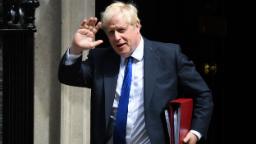Boris Johnson clings to power after dozens of British lawmakers resign and urge him to quit


Johnson began the day vowing to fight on, despite the shock resignations of his finance minister, health secretary and dozens of other lawmakers furious about the latest saga to engulf Downing Street: the botched handling of a resignation by Johnson’s former deputy chief whip, Chris Pincher, who was accused of groping two men last week.
Johnson endured a battering at Prime Minister’s Questions and a bruising appearance before a parliamentary committee of senior lawmakers in Parliament, before a delegation of cabinet members arrived at Downing Street to ask Johnson to resign.
But Johnson refused to go down without a fight. On Wednesday night, he sacked close ally and senior cabinet minister Michael Gove, who sources told CNN had urged Johnson earlier in the day to accept that his time was up.
Another key ally, Home Secretary Priti Patel, told Johnson that the general view of the Conservative party was that he had to go, a source close to Patel told CNN.
As the news of Gove’s firing emerged, a spokesman for Johnson insisted that the Prime Minister was in “really good spirits.”
Speaking to CNN, Johnson’s parliamentary private secretary James Duddridge said Johnson was “fighting on because he believes he can win.”
Asked about Gove, Duddridge said, “I like Michael, Michael has been a great Secretary of State in many ways, he helps the Prime Minister in many ways,” adding that “he will be replaced, we will move on.”
The dramatic disintegration of Johnson’s political career could now be hours from completion; while he has so far refused to buckle, Conservative lawmakers were discussing reformulating their party rules and voting to oust him if needed.
“At some point, we have to conclude that enough is enough,” former Health Secretary Sajid Javid, the first of many ministers to resign in the past 24 hours, told Johnson in Parliament earlier Wednesday. “I have concluded that the problem starts at the top, that is not going to change.”
An endless series of scandals
Numerous prime ministers have been dumped from office by sudden and deadly rebellions within their own parties, with leaders typically choosing to resign once the writing is on the wall. But the speed with which Johnson’s government has tumbled toward the precipice echoes few episodes in British political history.
The Pincher saga was the final straw for many of his allies. Johnson narrowly survived a vote of no confidence in early June, but rebels have threatened to tweak party rules and allow another vote in the near future if Johnson doesn’t resign — and it would now be expected that he would lose.
Duddridge said that Johnson understands that the lawmakers rallying against him could change the rules and call for another vote of confidence, but said a majority against him “is not a given.”
A sullen-faced Johnson struggled through Prime Minister’s Questions in Parliament and then fielded questions from MPs in a parliamentary committee meeting, during which even more of his allies pulled their support.
Johnson’s efforts to cling to power were branded “pathetic” by the opposition leader Keir Starmer, who also turned his attack towards the few allies in his Cabinet still propping him up. “In the middle of a crisis doesn’t the country deserve better than a Z list cast of nodding dogs?” Starmer asked in Parliament.
Should Johnson resign, a Conservative leadership campaign would begin and the winner would also take over as Prime Minister.
That person would need to navigate domestic issues, such as a cost of living crisis that has hit British households, and inherit a wealth of foreign pressures. Johnson has developed a good relationship with Ukrainian President Volodymyr Zelensky and been a leading player in Europe’s response to Russia’s invasion.
CNN’s Luke McGee contributed reporting.






